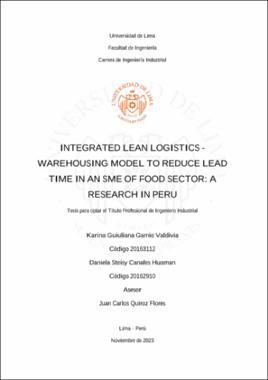Integrated lean logistics - warehousing model to reduce lead time in an SME of food sector: a research in Peru

Ver/
Tesis
(application/pdf: 428.5Kb)
(application/pdf: 428.5Kb)
Autorización
(application/pdf: 216.7Kb)
(application/pdf: 216.7Kb)
Reporte de similitud
(application/pdf: 1.926Mb)
(application/pdf: 1.926Mb)
Fecha
2023Asesor(es)
Metadatos
Mostrar el registro completo del ítemResumen
The food industry represented 3.2% of the Gross Domestic Product (GDP) in Peru in 2019, in addition to presenting high employability since the sector contained 7.4% of the Economically Active Population (EAP). Due to the global crisis of COVID 19 in 2020, this sector has been affected, consequently the GDP of the restaurant and accommodation sector fell by 50.2% compared to the previous year. Therefore, the strengthening of this industry is considered crucial. Being one of the most critical links in the management of the material supply chain, this problem translates into late delivery of orders to your customers, which would generate large monetary losses and a bad reputation. In this sense, the present investigation proposes a comprehensive improvement model based on the combination of tools such as the 5S of the raw material under a multi-criteria ABC approach, FEFO, MRP, Forecasting and BPM whose objective is to reduce lead time. The model was validated through a simulation in Arena 16.1, where a reduction in delivery time and in the frequency of extra purchases was obtained by 7.2% and 50%. La industria alimentaria representó en el 2019 el 3,2% del Producto Bruto Interno (PBI) en el Perú, además de presentar una alta empleabilidad siendo que el sector contenía el 7,4% de la Población Económicamente Activa (PEA). A causa de la crisis mundial del COVID 19 en el 2020, este sector ha sido perjudicado, en consecuencia, el PBI del sector de restaurantes y alojamiento cayó un 50,2% con respecto al año anterior. Por ello, el fortalecimiento de esta industria se considera crucial. Siendo uno de los eslabones más críticos en la gestión de la cadena de suministro de material, este problema se traduce en la entrega tardía de los pedidos a sus clientes, lo que generaría grandes pérdidas monetarias y una mala reputación. En este sentido, la presente investigación propone un modelo de mejora integral basado en la combinación de herramientas tales como las 5S de la materia prima bajo un enfoque ABC multicriterio, FEFO, MRP, Forecasting y BPM cuyo objetivo es reducir el lead time. El modelo fue validado a través de una simulación en Arena 16.1, donde se obtuvo una reducción en el tiempo de entrega y en la frecuencia de compras extras en un 7.2% y 50%
Cómo citar
Gamio Valdivia, K. G., & Canales Huaman, D. S. (2023). Integrated lean logistics - warehousing model to reduce lead time in an SME of food sector: a research in Peru [Tesis para optar el Título Profesional de Ingeniero Industrial, Universidad de Lima]. Repositorio Institucional de la Universidad de Lima. https://hdl.handle.net/20.500.12724/20111Editor
Universidad de LimaTemas
Coleccion(es)
- Tesis [1207]

